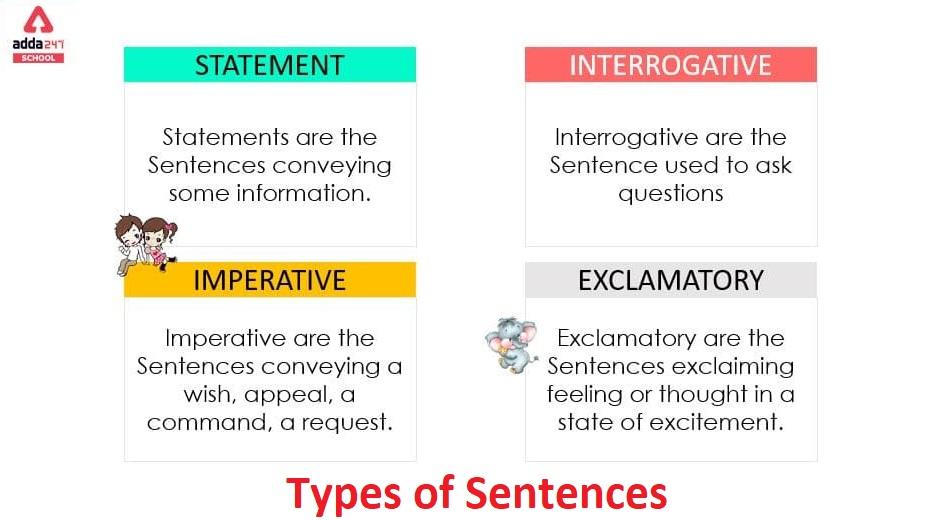There are four different sentence types in the English language. Sentences are the functional unit of the English language that conveys the full meaning or context. Sentences give our thoughts and ideas structure and meaning, making them the fundamental units of communication. Effective communication in written and spoken language requires an understanding of the four basic sentence forms. These four sentence types in English are Declarative, Interrogative, Exclamatory, and Imperative sentences. In this article, we will learn about these types along with their examples. We will also get a detailed explanation of these types and how they differ from one another.
Types of Sentences in English
Types of Sentences: The sentence is the most important part of the English language. In the English language, there are 4 different types of sentences. To be a good communicator one must know all the types of the sentences because if one uses a similar form of the sentence throughout the speech or writing then it will become uninteresting. These sentences cover different sentence forms that can be thought of in the English language like sentences for question, command, request, statement, instruction, and so on. So, to make your speech interesting we are here to teach you different types of sentences. In this article, you will learn different types of the sentences with examples.
Let’s start our learning
Types of Sentences: What is a Sentence?
A sentence is a group of words that conveys a complete idea. Sentence is basically the functional and fundamental unit of the English communication. Complete sentences must have at least one subject and predicate, and the predicate contains a verb. A subject is what we talk of and the predicate describes the subject. Complete sentences start with a capital letter, and they end with a punctuation mark such as a period, exclamation point, or question mark depending on the type of sentence.
Types of Sentences with Definitions
Four sentences’ types of the English language are given here: declarative, interrogatives, imperatives and exclamations. Using different sentences in your writing will increase your interest and help you communicate your ideas effectively.
Read the explanations and examples of each type of sentence to get the point.
4 Types of Sentences with Examples
-
Declarative Types of sentences (statement)
A declarative statement or assertive sentence is the most basic type of statement. They are meant to convey information and are separated by periods. A simple declarative statement allows you to create basic statements such as:
- I am a teacher.
- There is a white palace.
- The cat is sleeping on the sofa.
- She likes the blue colour.
Note:- Declarative sentence always ends with a period (full stop).
2. Interrogative Types of sentences (question)
Interrogative sentences are used to ask questions. Questions can be of any type. These are the direct questions separated by the question mark. For example:-
- Why are you going there?
- Do you love to play cricket?
- What do you want; chocolate or ice cream?
- Can I come with you?
3. Imperative Types of sentences (commands and requests)
Imperative sentences are used for commands, requests or orders. They can be in any form like direct order, general advice or polite request. Many imperative sentences are separated by period but sometimes more forceful commands end with an exclamation mark. For example:-
- Sit down!
- Please give me a glass of water.
- Pick up the garbage when you go.
- Don’t make noise!
4. Exclamatory sentence Type (exclamation)
An exclamation is a sentence that is used to express a sudden strong feeling and ends with an exclamation mark. Similar to declarative statements in that they provide information, but end with an exclamation point instead of a period. For example:-
- Hurrah! India won the match.
- Wow, how good this is!
- How beautifully she has drawn the painting!
- How he lied!
4 Types of Sentences on the basis of structure
If we read about the classification of sentenceson the basis of structure, then there are also 4-kinds of sentences, and these are:
- Simple sentence
- Compound Sentence.
- Complex sentence
- Compound-Complex sentence.
Now, we will read each type of sentences in more detail
Selecting the Right type of Sentence
Using the correct type of sentence in your writing depends on your intent.
- To communicate information, use a declarative sentence.
- To get the answer of any question, use an interrogative sentence.
- To tell someone what to do, use imperative sentence.
- To express your feelings, sudden emotions, use exclamatory sentence.
Types of Sentences: Quick Revision
The table below is the summary of these 4-kinds of sentences
| Types of Sentence on the basis of Function | ||
| Types of Sentence | Objective of Sentence | Punctuation Mark |
| Declarative | To make statement or to convey message | Full Stop (.) |
| Interrogative | To ask a question | Question marks (?) |
| Exclamatory | To express emotion | Exclamation mark (!) |
| Imperative | To give command, order and to request | Full stop (.) |
Types of Sentences: Exercises
Q.1 Look at the following sentences and check whether Declarative, Interrogative, Imperative or Exclamatory.
- Do you drink juice daily?
- Stars are twinkling in the sky.
- Ah! What a lovely garden.
- Let us go for a cricket match.
- Let us go to watch a movie.
- The train is not departing on time.
- Where has she gone?
- Call in the doctor please.
- Kindly lend me some money.
- I like this flower.
Check your answers
- Interrogative
- Declarative
- Exclamatory
- Imperative
- Imperative
- Declarative
- Interrogative
- Imperative
- Imperative
- Declarative
Q.2 Rewrite these type of sentence as indicated in the bracket.
- It is a lovely scenery. (Exclamatory)
- Bravo! you have played well. (Assertive)
- She did not dance well. (Interrogative)
- Will you lend me some money? (Imperative)
- Show me the road to go out. (Interrogative)
Check your answers
- Wow! What a lovely scenery.
- You have played bravely.
- Did she dance well?
- Kindly lend me some money.
- Which road goes out?
All 12 Kinds of Sentences
Sentences can be categorized into different types based on their structure and function. Here are some common kinds of sentences:
- Declarative Sentences: These sentences make a statement or provide information. They typically end with a period. For example, “I am going to the store.”
- Interrogative Sentences: These sentences ask questions and seek information. They end with a question mark. For example, “What time is it?”
- Imperative Sentences: These sentences give commands, instructions, or requests. They often do not include a subject and end with a period or an exclamation mark. For example, “Please pass the salt.”
- Exclamatory Sentences: These sentences express strong emotions or excitement and typically end with an exclamation mark. For example, “What a beautiful sunset!”
- Conditional Sentences: These sentences express a condition and its result. They often use words like “if,” “unless,” or “provided that.” For example, “If it rains, we will stay inside.”
- Complex Sentences: These sentences consist of one main clause (independent clause) and one or more subordinate clauses (dependent clauses). The clauses are linked together to form a complex structure. For example, “Although it was raining, they decided to go for a walk.”
- Compound Sentences: These sentences combine two or more independent clauses (main clauses) using coordinating conjunctions (such as “and,” “but,” “or,” “for,” “nor,” “so,” or “yet”). For example, “I wanted to go to the movies, but I couldn’t get a ticket.”
- Simple Sentences: These sentences consist of a single independent clause and typically express a complete thought. For example, “She loves to read.”
- Rhetorical Questions: These are questions asked not to obtain information but to make a point or create emphasis. They are often used in a way that does not expect a response. For example, “Do you think I’m stupid?”
- Direct Speech: Sentences that convey spoken words exactly as they were said. For example, “He said, ‘I’ll be there at 3 o’clock.'”
- Indirect Speech: Sentences that report what someone else has said without quoting their exact words. For example, “She said that she would come later.”
- Narrative Sentences: These sentences are used to tell a story or describe a series of events. They often use past tense and include details to create a narrative flow. For example, “Once upon a time, in a faraway land, there lived a brave knight.”
- Descriptive Sentences: These sentences provide vivid descriptions of people, places, objects, or situations. They use adjectives and adverbs to paint a picture in the reader’s mind. For example, “The old, dusty book sat on the wooden shelf.”
These are some of the common kinds of sentences, and sentences can often fall into multiple categories at once, depending on their structure and purpose.
5 Kinds of Sentences with Examples
- Declarative Sentence: A declarative sentence makes a statement or expresses an opinion.Example: “The sun rises in the east.”
- Interrogative Sentence: An interrogative sentence asks a question.Example: “Did you finish your homework?”
- Imperative Sentence: An imperative sentence gives a command or makes a request.Example: “Please pass me the salt.”
- Exclamatory Sentence: An exclamatory sentence conveys strong emotion or excitement.Example: “What a beautiful sunset!”
- Conditional Sentence: A conditional sentence expresses a hypothetical situation and its possible outcome.Example: “If it rains, we will stay indoors.”
Remember that these sentence types can often be combined or modified to create more complex sentences.
Different Types of Sentences in Hindi
वाक्यों के प्रकार: वाक्य अंग्रेजी भाषा का सबसे महत्वपूर्ण हिस्सा है। अंग्रेजी भाषा में 4 विभिन्न प्रकार के वाक्य होते हैं। एक अच्छा संचारक होने के लिए सभी प्रकार के वाक्यों को जानना आवश्यक है क्योंकि यदि कोई वाक्य के समान रूप का उपयोग पूरे भाषण या लेखन में करता है तो यह निर्बाध हो जाएगा। इसलिए, आपके भाषण को रोचक बनाने के लिए हम यहां आपको विभिन्न प्रकार के वाक्य सिखा रहे हैं। इस लेख में, आप उदाहरणों के साथ विभिन्न प्रकार के वाक्यों के बारे में जानेंगे।
वाक्य के प्रकार : वाक्य क्या है ?
एक वाक्य शब्दों का एक समूह है जो एक पूर्ण विचार व्यक्त करता है। पूर्ण वाक्यों में कम से कम एक विषय और विधेय होना चाहिए, और विधेय में एक क्रिया होती है। एक विषय वह है जिसके बारे में हम बात करते हैं और विधेय विषय का वर्णन करता है। पूर्ण वाक्य एक बड़े अक्षर से शुरू होते हैं, और वे विराम चिह्न के साथ समाप्त होते हैं जैसे कि अवधि, विस्मयादिबोधक बिंदु, या वाक्य के प्रकार के आधार पर प्रश्न चिह्न।
परिभाषा के साथ वाक्यों के प्रकार
अंग्रेजी भाषा में चार प्रकार के वाक्य हैं: घोषणात्मक, पूछताछ, अनिवार्यता और विस्मयादिबोधक। अपने लेखन में विभिन्न वाक्यों का उपयोग करने से आपकी रुचि बढ़ेगी और आपको अपने विचारों को प्रभावी ढंग से संप्रेषित करने में मदद मिलेगी।
बिंदु प्राप्त करने के लिए प्रत्येक प्रकार के वाक्य के स्पष्टीकरण और उदाहरण पढ़ें।
उदाहरण सहित वाक्यों के 4 प्रकार
1.घोषणात्मक वाक्य (बयान)
एक घोषणात्मक बयान या मुखर वाक्य सबसे बुनियादी प्रकार का बयान है। वे जानकारी देने के लिए होते हैं और अवधियों से अलग होते हैं। एक साधारण घोषणात्मक कथन आपको बुनियादी विवरण बनाने की अनुमति देता है जैसे:
मैं एक शिक्षक हूं.
एक सफेद महल है।
बिल्ली सोफे पर सो रही है।
उसे नीला रंग पसंद है।
नोट:- घोषणात्मक वाक्य हमेशा एक अवधि (पूर्ण विराम) के साथ समाप्त होता है।
2. प्रश्नवाचक वाक्य (प्रश्न)
प्रश्न पूछने के लिए प्रश्नवाचक वाक्यों का प्रयोग किया जाता है। प्रश्न किसी भी प्रकार के हो सकते हैं। ये प्रश्न चिह्न द्वारा अलग किए गए प्रत्यक्ष प्रश्न हैं। उदाहरण के लिए:-
तुम वहाँ क्यों जा रहे हैं?
क्या आपको क्रिकेट खेलना पसंद है?
आप क्या चाहते हैं; चॉकलेट या आइसक्रीम?
क्या मैं तुम्हारे साथ आ सकता हू?
3. अनिवार्य वाक्य (आदेश और अनुरोध)
आज्ञाओं, अनुरोधों या आदेशों के लिए अनिवार्य वाक्यों का उपयोग किया जाता है। वे सीधे आदेश, सामान्य सलाह या विनम्र अनुरोध जैसे किसी भी रूप में हो सकते हैं। कई अनिवार्य वाक्यों को अवधि से अलग किया जाता है लेकिन कभी-कभी अधिक शक्तिशाली आदेश विस्मयादिबोधक चिह्न के साथ समाप्त होते हैं। उदाहरण के लिए:-
बैठ जाओ!
कृपया मुझे एक गिलास पानी दें।
जाते समय कूड़ा उठायें।
शोर मत करो!
4. विस्मयादिबोधक वाक्य (विस्मयादिबोधक)
विस्मयादिबोधक एक वाक्य है जिसका उपयोग अचानक मजबूत भावना को व्यक्त करने के लिए किया जाता है और विस्मयादिबोधक चिह्न के साथ समाप्त होता है। घोषणात्मक बयानों के समान ही वे जानकारी प्रदान करते हैं, लेकिन एक अवधि के बजाय विस्मयादिबोधक बिंदु के साथ समाप्त होते हैं। उदाहरण के लिए:-
हुर्रे! भारत ने मैच जीत लिया।
वाह, यह कितना अच्छा है!
उसने कितनी खूबसूरती से पेंटिंग बनाई है!
उसने कैसे झूठ बोला!
Related Post:









 Madras University Result 2025 OUT at uno...
Madras University Result 2025 OUT at uno...
 CUET Geography Important Topics 2026 | B...
CUET Geography Important Topics 2026 | B...
 BCECE LE 2025 Counselling Dates Out, Che...
BCECE LE 2025 Counselling Dates Out, Che...









